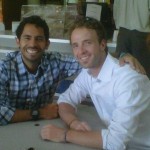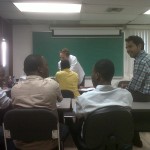Hello Everyone!
It’s hard to believe Aldo and I have already been here in Haiti for 4 weeks. We arrived on May 22nd into Port Au Prince from Miami and were picked up at the airport by two of our main contacts with EGI, Stephen and Patrick. EGI is the “Economic Growth Initiative”, a non profit focused on helping to develop entrepreneurs here in Haiti. Stephen is one of the founders and now sits on the board of the organization. Patrick is a local businessman who has invested a lot of his time into helping to build Haiti through business. It reminds me a lot of the things we learned in Business on the Frontlines, a unique course Notre Dame offers that highlights the challenges and opportunities of doing business in under-developed countries.
Our “job” here in Haiti has two aspects. The first is teaching a business-plan bootcamp to a group of EGI participants, many of whom graduated from a charter school here in Haiti that Patrick helps run. The charter school accepts promising students from poor families who have shown academic promise in the country’s standardized tests taken between elementary school and secondary school. At the school they learn 4 languages: French, creole, Spanish, and English. It’s quite an amazing thing.
The bootcamp is run 3 nights a week for 2 hours. Aldo and I take turns teaching core business concepts. Week 1 was Accounting, week 2 Finance, week 3 we hit Marketing and week 4 we talked about Operations. The students are very eager to learn and we have had very good in-class participation. Accompanying the teaching we’ve also had them give briefs on local business news and perform SWOT analysis on local businesses to get them used to evaluating things through a business lens. Where are the opportunities, how might this be a threat to my business idea, etc…
Every student came in with a business idea, some of which have morphed over the course of the class. Our secondary job role is to act as consultants to help the students evaluate their specific business ideas in a 1-on-1 setting as well as working with other local business people on occasion. Student business ideas include internet cafes, a computer literacy lab, a reforestation project and a couple of farming operations. We’ve also had a chance to talk to a couple of guys who are farming Tilapia on a massive scale. There’s a lot of opportunity there because they want someone else to do the distribution so we’ve talked about a franchisee model involving some of the students. Nothing is concrete at this point, but it’s good to have some critical discussions about the businesses and help the students things flesh out.
We’re using some online software called Pitch Then Plan that is good for helping to flesh out business ideas. The basic premise is to work on the pitch part first, so you understand exactly what you want to do. Once you understand that and you can talk about it coherently and cohesively, you do all the grunt work to pull the numbers that show your idea is viable. Our students will most likely get only as far as the pitch and we’ll help them start with their numbers but they’ll be well prepared to go out and do the necessary research.
“So how’s Haiti”, you’re probably wondering, I wasn’t sure what to expect when we arrived. You hear lots of awful things about Haiti and I didn’t want to believe them. Most of the rubble from the earthquake has been removed though much remains to be done to rebuild. It’s tough to tell what was already in bad shape before the quake and what’s gotten worse after. The country needs a lot of infrastructure work. The roads are quite bad, most of them unpaved and there’s little accomodation for sewer management so when it rains things just flood. Our electrical access is fairly constant but only because of a plethora of generators and batteries in the areas we visit. Haiti’s public utility company has troubles keeping the power on all the time. Actually the government seems to be one of the biggest problems here but then again where isn’t it. Despite the troubles people here seem to be happy and for the most part industrious. I see people sitting around but they are sitting in front of goods for sale and there are always people milling about. Safety is still a concern so we’ve spent a lot of time at the guest house we’ve been staying at in a region of the city known as Delmas.
Well this is probably enough for a first post. I’ll be writing more to help catch you up on some of the details of our trip. See you soon!

